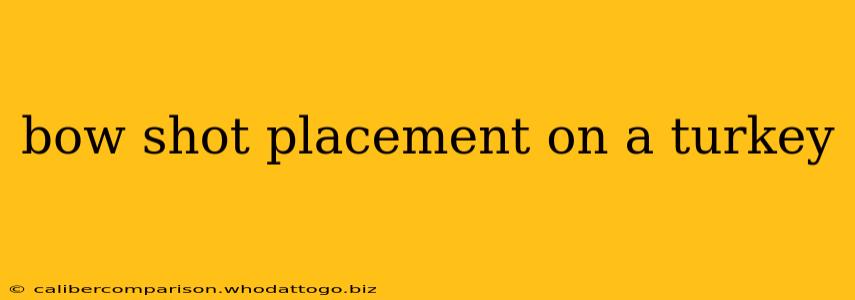Turkey hunting with a bow presents unique challenges compared to firearm hunting. Precision and shot placement are paramount due to the smaller size of the vital area and the potential for wounding a bird without a clean kill. This guide will delve into the optimal shot placement for ethical and successful bow hunting of turkeys.
Understanding Turkey Anatomy: Key Areas for a Lethal Shot
Before discussing shot placement, it's crucial to understand a turkey's anatomy. The most effective shots target the bird's vital organs, primarily located in the chest cavity. These include the heart and lungs. A shot that penetrates these areas ensures a quick and humane kill.
The Kill Zone: Where to Aim
The kill zone on a turkey is relatively small, roughly the size of a softball, situated just behind the breastbone and extending to the base of the neck. Aiming for this area maximizes your chances of a clean, one-shot kill.
-
The "Sweet Spot": The ideal shot placement is slightly below and behind the base of the neck, where the heart and lungs are concentrated. This area offers the largest target of vital organs.
-
Avoid the Wings and Legs: Shots to the wings and legs are unlikely to be lethal and will likely result in a wounded bird.
-
Head Shots are Risky: While head shots are sometimes possible, they are not recommended due to the small size of the target and the difficulty of consistent placement. A poorly placed head shot can severely wound the bird without a quick kill.
Bow Hunting Techniques for Accurate Shot Placement
Accurate shot placement requires practice and a solid understanding of your bow and arrow setup. Here are some crucial techniques:
Proper Stance and Aim
-
Stable Stance: Maintain a stable and balanced stance, keeping your body relaxed but alert.
-
Proper Draw: Execute a smooth, consistent draw, ensuring proper anchor point and aiming.
-
Target Acquisition: Take your time to acquire a clear sight picture, focusing on the "sweet spot" in the turkey's chest cavity. Do not rush the shot.
Range Estimation and Arrow Selection
-
Accurate Range Estimation: Accurately judge the distance to the turkey. Overestimating or underestimating the range can significantly impact shot placement. Practice range estimation beforehand.
-
Appropriate Arrow Selection: Use an arrow with sufficient penetration for the distance and the expected angle of the shot. Heavier arrow weights generally offer better penetration.
Patience and Shot Selection
-
Patience is Key: Don't force a shot. Wait for the perfect opportunity when the turkey is broadside or offering a clear shot at the vital area. An ethical harvest is more important than a quick shot.
-
Shot Selection: Assess the situation before releasing the arrow. Consider factors like the background, the angle of the shot, and potential obstructions.
Post-Shot Procedures
After the shot, follow up appropriately to ensure a humane kill:
-
Immediate Observation: Observe the turkey's reaction to the shot. If the bird runs a short distance and collapses, it likely received a well-placed shot.
-
Accurate Tracking: If the bird doesn't immediately drop, approach cautiously and track it, noting blood trails and signs of the arrow’s path. A wounded bird requires immediate attention.
-
Ethical Harvesting: If the turkey is wounded but not immediately killed, ensure a quick and humane dispatch to minimize suffering.
Conclusion: Responsible Bow Hunting
Successful and ethical bow hunting of turkeys requires a combination of knowledge, skill, and responsible hunting practices. By understanding turkey anatomy, mastering proper shot placement techniques, and prioritizing ethical considerations, you can significantly increase your chances of a clean and successful harvest. Remember, responsible hunting practices ensure the sustainability of turkey populations and the integrity of the hunting experience.

